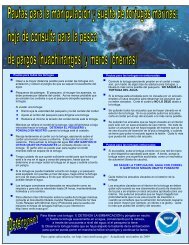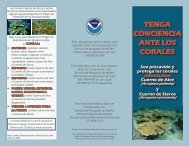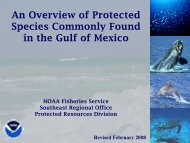Gulf of Mexico Grouper, Tilefish, and Red Snapper IFQ Program
Gulf of Mexico Grouper, Tilefish, and Red Snapper IFQ Program
Gulf of Mexico Grouper, Tilefish, and Red Snapper IFQ Program
Create successful ePaper yourself
Turn your PDF publications into a flip-book with our unique Google optimized e-Paper software.
Frequently Asked Questions for the<br />
<strong>Gulf</strong> <strong>of</strong> <strong>Mexico</strong> <strong>Red</strong> <strong>Snapper</strong> <strong>and</strong> <strong>Grouper</strong>-<strong>Tilefish</strong><br />
Individual Fishing Quota (<strong>IFQ</strong>) <strong>Program</strong>s<br />
December 2012<br />
Table <strong>of</strong> Contents<br />
FREQUENTLY ASKED QUESTIONS FOR ACTIVE <strong>IFQ</strong> PARTICIPANTS ...................................... 2<br />
<strong>IFQ</strong> SPECIES AND FLEXIBILITY MEASURES ............................................................................................ 2<br />
SHARE AND ALLOCATION TRANSFERABILITY ........................................................................................ 3<br />
LANDING LOCATIONS AND NOTIFICATIONS ............................................................................................ 3<br />
LANDING TRANSACTIONS ........................................................................................................................ 4<br />
<strong>IFQ</strong> ACCOUNTS AND GULF REEF FISH PERMITS .................................................................................... 5<br />
CHANGING OWNERSHIP OF AN <strong>IFQ</strong> ACCOUNT ....................................................................................... 6<br />
<strong>IFQ</strong> ENDORSEMENTS ............................................................................................................................... 7<br />
MISCELLANEOUS QUESTIONS .................................................................................................................. 7<br />
FREQUENTLY ASKED QUESTIONS ABOUT THE <strong>IFQ</strong> PROGRAM .............................................. 8<br />
SYSTEM REQUIREMENTS AND ACCOUNT INFORMATION ........................................................................ 8<br />
ELIGIBILITY REQUIREMENTS FOR AN <strong>IFQ</strong> ACCOUNT ............................................................................... 8<br />
ALLOCATION AND SHARES ..................................................................................................................... 10<br />
APPORTIONMENT OF INITIAL <strong>IFQ</strong> SHARES ............................................................................................. 11<br />
APPEALS ................................................................................................................................................. 12
FREQUENTLY ASKED QUESTIONS FOR ACTIVE <strong>IFQ</strong> PARTICIPANTS<br />
<strong>IFQ</strong> SPECIES AND FLEXIBILITY MEASURES<br />
WHAT SPECIES ARE INCLUDED IN EACH SHARE CATEGORY OF THE <strong>IFQ</strong> PROGRAM<br />
<strong>IFQ</strong> SHARE CATEGORY<br />
DEEP-WATER GROUPER (DWG)<br />
GAG<br />
OTHER SHALLOW-WATER GROUPER (OSWG)<br />
RED GROUPER<br />
RED SNAPPER<br />
TILEFISH<br />
SPECIES<br />
SNOWY GROUPER<br />
SPECKLED HIND<br />
WARSAW GROUPER<br />
YELLOWEDGE GROUPER<br />
GAG<br />
BLACK GROUPER<br />
SCAMP<br />
YELLOWFIN GROUPER<br />
YELLOWMOUTH GROUPER<br />
RED GROUPER<br />
RED SNAPPER<br />
BLUELINE (GREY) TILEFISH<br />
GOLDEN TILEFISH<br />
GOLDFACE TILEFISH<br />
The following species were part <strong>of</strong> the <strong>IFQ</strong> program from 2010-2011, but were removed in 2012:<br />
o Misty grouper from the deep-water grouper share category<br />
o <strong>Red</strong> hind <strong>and</strong> rock hind from the other shallow-water grouper share category<br />
o Anchor <strong>and</strong> blackline tilefish from the tilefish share category<br />
CAN SOME SPECIES BE LANDED USING MORE THAN ONE SHARE CATEGORY<br />
Yes, the <strong>Grouper</strong>-<strong>Tilefish</strong> <strong>IFQ</strong> program has several built-in flexibility measures to reduce discards.<br />
Deep-water grouper <strong>and</strong> other shallow-water grouper flexibility measures:<br />
o The primary share category for l<strong>and</strong>ing warsaw grouper <strong>and</strong> speckled hind is deep-water grouper.<br />
However, when all <strong>of</strong> a shareholder’s deep-water grouper allocation has been used, the fisherman<br />
may l<strong>and</strong> warsaw <strong>and</strong> speckled hind with shallow-water grouper allocation. A shareholder’s<br />
allocation includes allocation in the shareholder account <strong>and</strong> all associated vessel accounts.<br />
o The primary share category for l<strong>and</strong>ing scamp is shallow-water grouper. However, when all <strong>of</strong> a<br />
shareholder’s shallow-water grouper allocation has been used, the fisherman may l<strong>and</strong> scamp with<br />
deep-water grouper allocation. A shareholder’s allocation includes allocation in the shareholder<br />
account <strong>and</strong> all associated vessel accounts.<br />
Gag <strong>and</strong> red grouper multi-use flexibility measures:<br />
o A portion <strong>of</strong> the gag or red grouper allocation is reserved whenever quota is released for multi-use<br />
allocation which can be used to l<strong>and</strong> either gag or red grouper. This percentage may change each<br />
year.<br />
o Multi-use allocation cannot be used until the fisherman has l<strong>and</strong>ed or sold all <strong>of</strong> the speciesspecific<br />
allocation in their shareholder account <strong>and</strong> all associated vessel accounts. For example,<br />
gag may not be l<strong>and</strong>ed under gag-multiuse or red-multiuse allocation, unless there is no gag<br />
allocation available.<br />
o A shareholder’s allocation includes allocation in the shareholder account <strong>and</strong> all associated vessel<br />
accounts.<br />
o Currently, gag multi-use allocation is set to 8% <strong>of</strong> the gag allocation <strong>and</strong> red-multiuse allocation is<br />
set to 0% <strong>of</strong> the red grouper allocation.<br />
2
DOES THE <strong>IFQ</strong> PROGRAM HAVE A LANDING OVERAGE PROVISION FOR <strong>IFQ</strong> SHAREHOLDERS<br />
Yes, <strong>IFQ</strong> shareholders can l<strong>and</strong> 10% over their remaining allocation on the last fishing trip <strong>of</strong> the year.<br />
Any overage will be subtracted from the shareholder's allocation at the start <strong>of</strong> the next fishing year.<br />
For example, if 100 pounds <strong>of</strong> red snapper are in an <strong>IFQ</strong> vessel's account on the last fishing trip <strong>of</strong> the<br />
year, the shareholder may l<strong>and</strong> 110 pounds <strong>of</strong> red snapper. However, 10 pounds will be subtracted from<br />
the shareholder's allocation on January 1, the following year.<br />
Because overages need to be subtracted from the shareholder’s allocation at the start <strong>of</strong> the following year,<br />
share transfers will not be allowed that would reduce the shareholder’s <strong>IFQ</strong> shares lower than the amount<br />
needed to pay back the overage.<br />
Only <strong>IFQ</strong> fishers who hold shares are allowed to l<strong>and</strong> in excess <strong>of</strong> their remaining allocation, <strong>and</strong> only for<br />
categories which they hold shares.<br />
SHARE AND ALLOCATION TRANSFERABILITY<br />
WHO IS ELIGIBLE TO BUY <strong>IFQ</strong> SHARES OR ALLOCATION<br />
For the first five years <strong>of</strong> each program, anyone who owns a valid or renewable commercial <strong>Gulf</strong> <strong>of</strong><br />
<strong>Mexico</strong> reef fish permit <strong>and</strong> an active <strong>IFQ</strong> shareholder account is eligible to receive <strong>IFQ</strong> shares <strong>and</strong><br />
allocation from current <strong>IFQ</strong> shareholders. After January 1, 2012, all U.S. citizens <strong>and</strong> permanent resident<br />
aliens with an <strong>IFQ</strong> shareholder account are eligible to receive red snapper <strong>IFQ</strong> shares <strong>and</strong> allocation<br />
After January 1, 2015, all U.S. citizens <strong>and</strong> permanent resident aliens with an <strong>IFQ</strong> shareholder account<br />
will be eligible to purchase grouper <strong>and</strong> tilefish <strong>IFQ</strong> shares <strong>and</strong> allocation.<br />
CAN MULTI-USE ALLOCATION BE SOLD<br />
Multi-use allocation may only be transferred after l<strong>and</strong>ing or selling all the corresponding speciesspecific<br />
allocation related to their shareholder account (e.g. in shareholder <strong>and</strong> associated vessel<br />
accounts).<br />
o For example, a fisherman can only sell his gag multi-use allocation if he has used all <strong>of</strong> his gag<br />
allocation in his shareholder <strong>and</strong> vessel accounts.<br />
The restrictions on the sale <strong>of</strong> multi-use allocation ensure a fisherman has allocation to use if either gag<br />
or red grouper are l<strong>and</strong>ed as bycatch.<br />
HOW ARE SHARES AND ALLOCATION TRANSFERRED<br />
All transfers take place online via the <strong>IFQ</strong> Web site (see Troubleshooting guide for details).<br />
For share transfers, approval is required from both the transferor <strong>and</strong> transferee.<br />
For allocation transfers, approval is only required from the transferor.<br />
Transfer <strong>of</strong> shares <strong>and</strong> associated allocation are independent. To transfer both shares <strong>and</strong> allocation, the<br />
transferor must complete both a share transfer <strong>and</strong> an allocation transfer.<br />
An individual who has been sanctioned will not be permitted to transfer shares or allocation.<br />
LANDING LOCATIONS AND NOTIFICATIONS<br />
WHAT ARE THE LANDING AND OFFLOADING TIME REQUIREMENTS<br />
A vessel can l<strong>and</strong> <strong>IFQ</strong> species anytime during the day <strong>and</strong> night, provided that a l<strong>and</strong>ing notification has<br />
been given between 3 to 12 hours prior to l<strong>and</strong>ing.<br />
Offloading is restricted to the hours <strong>of</strong> 6 a.m. to 6 p.m.<br />
Fishers only need to notify law enforcement in advance <strong>of</strong> l<strong>and</strong>ing, not <strong>of</strong>floading.<br />
Please Note: For the purposes <strong>of</strong> these regulations, the term “l<strong>and</strong>ing” means to arrive at a dock, berth,<br />
beach, seawall, or ramp. “Offloading” is the removal <strong>of</strong> <strong>IFQ</strong> managed species from a vessel.<br />
3
WHY MUST PRE-APPROVED LANDING LOCATIONS BE USED<br />
Approving l<strong>and</strong>ing locations in advance ensures the sites actually exist <strong>and</strong> law enforcement agents can<br />
access these sites. L<strong>and</strong>ing locations must be publicly accessible by l<strong>and</strong> <strong>and</strong> water.<br />
Proposed l<strong>and</strong>ing locations can be submitted via the <strong>IFQ</strong> Web site or by calling <strong>IFQ</strong> Customer Service 1-<br />
866-425-7627 during normal business hours (8:00 a.m. to 4:30 p.m.).<br />
New l<strong>and</strong>ing locations will be approved only at the end <strong>of</strong> each calendar-year quarter. To have a l<strong>and</strong>ing<br />
location approved by the end <strong>of</strong> the calendar-year quarter, it must be submitted at least 45 days before the<br />
end <strong>of</strong> the calendar-year quarter.<br />
HOW AND WHY IS A LANDING NOTIFICATION REPORTED<br />
The l<strong>and</strong>ing notification requirement is intended to provide law enforcement <strong>of</strong>ficers the opportunity to be<br />
present at the point <strong>of</strong> l<strong>and</strong>ing so they can monitor <strong>and</strong> enforce <strong>IFQ</strong> requirements dockside.<br />
L<strong>and</strong>ing notifications can be made by using the form on the vessel monitoring system (VMS) screen, by<br />
calling 1-866-425-7627, or by logging into their online <strong>IFQ</strong> account.<br />
Please note: Updates to the l<strong>and</strong>ing notification screen on VMS units are constrained by programming<br />
requirements. Therefore, approved l<strong>and</strong>ing locations may not appear on the VMS screen until the next update<br />
to the VMS system. All approved l<strong>and</strong>ing locations are available when making a notification by phone or<br />
online.<br />
WHAT INFORMATION MUST BE PROVIDED ON THE <strong>IFQ</strong> LANDING NOTIFICATION<br />
<strong>IFQ</strong> participants must report a l<strong>and</strong>ing notification at least 3 hours, but no more than 12 hours, prior to<br />
any l<strong>and</strong>ing. Information required for a l<strong>and</strong>ing notification includes (but may not be limited to):<br />
o Vessel identification<br />
o Approved l<strong>and</strong>ing location<br />
o Dealer’s business name<br />
o Time <strong>of</strong> arrival<br />
o Estimated pounds to be l<strong>and</strong>ed in each share category<br />
Please Note: The confirmation code does not automatically give the fisherman permission to l<strong>and</strong> the vessel.<br />
It simply provides the National Marine Fisheries Service (NMFS) a confirmation that a l<strong>and</strong>ing notification<br />
was made. The fisherman is responsible for ensuring all regulations are satisfied (i.e., waiting 3 hours before<br />
l<strong>and</strong>ing, etc).<br />
WILL MULTIPLE LANDING NOTIFICATIONS BE NEEDED IF LANDING AT MORE THAN ONE LOCATION<br />
Yes, if for a vessel containing <strong>IFQ</strong> managed species which intends to l<strong>and</strong> at more than one location,<br />
separate l<strong>and</strong>ing notifications must be made for each l<strong>and</strong>ing location. The required 3-12 hour notification<br />
applies to both notifications <strong>and</strong> may be submitted sequentially.<br />
WILL SEPARATE LANDING NOTIFICATIONS BE NEEDED IF THE DEALER HAS BEEN CHANGED BUT<br />
NOT THE LANDING LOCATION<br />
Yes, a new l<strong>and</strong>ing notification must be submitted for any changes in dealer. However, an additional 3<br />
hours wait is not required, since the l<strong>and</strong>ing location has not changed.<br />
LANDING TRANSACTIONS<br />
HOW ARE LANDING TRANSACTIONS COMPLETED<br />
<br />
The dealer enters the pounds (gutted) <strong>and</strong> actual ex-vessel value <strong>of</strong> l<strong>and</strong>ed fish <strong>of</strong> each species, along with<br />
other information.<br />
o Actual ex-vessel value means the price paid per pound <strong>of</strong> fish before any deductions are made for<br />
4
transferred (leased) allocation <strong>and</strong> goods <strong>and</strong> services (e.g., bait, ice, fuel, repairs, machinery<br />
replacement, etc.).<br />
The fisherman validates the dealer transaction report by entering the unique Personal Identification<br />
Number (PIN) for the vessel account.<br />
After the dealer submits the report <strong>and</strong> NMFS verifies the information, the online system sends a<br />
transaction approval code to the dealer <strong>and</strong> the allocation holder. This approval code is necessary to verify<br />
the transaction is legal <strong>and</strong> the vessel account has the correct amount <strong>of</strong> grouper <strong>and</strong> tilefish allocation<br />
before the fish are transported.<br />
If a discrepancy regarding the l<strong>and</strong>ing transaction is discovered after approval, the dealer or vessel account<br />
holder (or his or her authorized agent) can initiate a l<strong>and</strong>ing transaction correction form.<br />
HOW DO I DETERMINE THE EX-VESSEL VALUE OF MY <strong>IFQ</strong> FISH<br />
Actual ex-vessel value means the price paid per pound <strong>of</strong> fish before any deductions are made for<br />
transferred (leased) allocation <strong>and</strong> goods <strong>and</strong> services (e.g., bait, ice, fuel, repairs, machinery replacement,<br />
etc.).<br />
This allows NMFS to more accurately analyze the total value <strong>of</strong> the <strong>Gulf</strong> red snapper <strong>and</strong> grouper/tilefish<br />
component <strong>of</strong> the reef fish fishery.<br />
HOW ARE OVERAGES ADDRESSED<br />
In the event a fisherman thinks they have harvested an amount <strong>of</strong> <strong>IFQ</strong> species that exceeds the existing<br />
allocation in the vessel account, additional allocation should be transferred into the vessel account before<br />
placing a l<strong>and</strong>ing notification.<br />
A person on board a vessel l<strong>and</strong>ing the shareholder’s only remaining allocation from a share category can<br />
legally exceed, by up to 10%, the amount <strong>of</strong> the allocation remaining on that last fishing trip <strong>of</strong> the fishing<br />
year. See <strong>IFQ</strong> SPECIES AND FLEXIBILITY MEASURES Section for more information.<br />
WHEN CAN <strong>IFQ</strong> SPECIES BE TRANSPORTED ON LAND<br />
A l<strong>and</strong>ing transaction with a dealer must be completed <strong>and</strong> the transporter must have the approval code<br />
<strong>and</strong> a copy <strong>of</strong> the <strong>IFQ</strong> dealer endorsement before the <strong>IFQ</strong> species can be transported on l<strong>and</strong> by the<br />
fisherman or dealer.<br />
ARE COST RECOVERY FEES COLLECTED FOR THE <strong>IFQ</strong> PROGRAM<br />
<strong>IFQ</strong> fishermen are charged a cost recovery fee to recover a portion <strong>of</strong> the costs required to administer,<br />
manage, <strong>and</strong> enforce the <strong>IFQ</strong> programs.<br />
The current cost recovery fee is 3% <strong>of</strong> the ex-vessel value <strong>of</strong> the l<strong>and</strong>ed fish <strong>and</strong> will be re-evaluated each<br />
year.<br />
<strong>IFQ</strong> dealers are responsible for collecting the cost recovery fee from the shareholder at the time <strong>of</strong> each<br />
sales transaction <strong>and</strong> submitting fees to NMFS on a quarterly basis through the <strong>IFQ</strong> program using the<br />
pay.gov website.<br />
<strong>IFQ</strong> ACCOUNTS AND GULF REEF FISH PERMITS<br />
HOW IS A GULF REEF FISH PERMIT RELATED TO MY <strong>IFQ</strong> ACCOUNT<br />
An <strong>IFQ</strong> account must be related to a <strong>Gulf</strong> Reef Fish Permit in order to harvest <strong>IFQ</strong> species. The same<br />
names must be on both the <strong>IFQ</strong> account <strong>and</strong> <strong>Gulf</strong> Reef Fish Permit. Any change <strong>of</strong> names on a permit<br />
(e.g. adding or removing a spouse or partner) will separate the permit from the <strong>IFQ</strong> account. A new <strong>IFQ</strong><br />
account must then be established based on the names on the permit.<br />
5
WHEN THE PERMIT HOLDER’S NAME(S) CHANGE, HOW DOES THIS AFFECT MY <strong>IFQ</strong> ACCOUNT<br />
If the permit holders have changed, the permit is no longer related to your <strong>IFQ</strong> account. You must call<br />
<strong>IFQ</strong> Customer Support (866-425-7627, option 2; 8 a.m. <strong>and</strong> 4:30 p.m. Monday through Friday) to<br />
establish a new <strong>IFQ</strong> account that will match the name(s) on the permit. All permit holders must establish<br />
pro<strong>of</strong> <strong>of</strong> U.S. citizenship through either their permit application or the <strong>IFQ</strong> online account application.<br />
Please allow adequate time to establish an <strong>IFQ</strong> account, as it may take a few days for the new account’s<br />
sign-on <strong>and</strong> password to be mailed to you.<br />
IF MY PERMIT IS TRANSFERRED TO ANOTHER VESSEL, HOW DOES THIS AFFECT MY <strong>IFQ</strong> ACCOUNT<br />
Any vessel without an associated permit needs to transfer the allocation back to the shareholder account.<br />
Vessels without an associated permit are inactive <strong>and</strong> cannot be used to harvest <strong>IFQ</strong> species.<br />
If the vessel was not previously in the <strong>IFQ</strong> system, you will need to create a vessel account through your<br />
shareholder account. Before a vessel can be associated with an <strong>IFQ</strong> account the relationship between the<br />
permit, vessel <strong>and</strong> <strong>IFQ</strong> account must be established. See the Trouble-shooting Guide for detailed<br />
information on how to create a vessel account.<br />
If the vessel was previously in the <strong>IFQ</strong> system, the vessel account must be manually moved between <strong>IFQ</strong><br />
accounts by <strong>IFQ</strong> IT staff. Before a vessel account can be transferred to a different <strong>IFQ</strong> account, all<br />
allocation in that vessel account must be transferred back to its shareholder account. You may contact <strong>IFQ</strong><br />
Customer Support to begin the process. As this process is dependent upon the previous owner’s transfer<br />
<strong>of</strong> allocation from the vessel account to the shareholder account this may take several days to complete.<br />
CHANGING OWNERSHIP OF AN <strong>IFQ</strong> ACCOUNT<br />
I AM SELLING MY BUSINESS, WHAT HAPPENS TO THE <strong>IFQ</strong> ACCOUNT<br />
Selling the business but retaining the shares <strong>and</strong> allocation:<br />
o The shareholder must transfer the shares/allocation to an existing account or create a new account<br />
for the shares <strong>and</strong> allocation. Note, that <strong>Grouper</strong>-<strong>Tilefish</strong> shares <strong>and</strong> allocation can only be<br />
transferred to an <strong>IFQ</strong> account with an associated permit.<br />
Selling the business with the shares <strong>and</strong> allocation:<br />
o The <strong>IFQ</strong> account holder must provide the new owner with the <strong>IFQ</strong> UserID <strong>and</strong> PIN. The new<br />
owner now controls the <strong>IFQ</strong> account.<br />
HOW DOES SOMEONE HANDLE AN ACCOUNT FOR A DECEASED SHAREHOLDER<br />
If the account has multiple shareholders <strong>and</strong> the surviving shareholder(s) has the UserID <strong>and</strong> PIN – the<br />
surviving shareholder(s) can access the account.<br />
If the personal representative/executor/administrator <strong>of</strong> the deceased shareholder’s estate seeks access to<br />
the shareholder’s account, the personal representative/executor/administrator must provide the following<br />
to the Southeast Regional Office <strong>IFQ</strong> Support Team: (1) a copy <strong>of</strong> the court order appointing the personal<br />
representative/executor/administrator; <strong>and</strong> (2) a notarized statement requesting access to the shareholder’s<br />
account.<br />
If you have questions about a deceased shareholder’s account, call <strong>IFQ</strong> Customer Service at 1-866-425-<br />
7627 <strong>and</strong> select option 2 during normal business hours (8:00 a.m. to 4:30 p.m.)<br />
If the shareholder(s) has a commercial <strong>Gulf</strong> <strong>of</strong> <strong>Mexico</strong> reef fish permit, contact the Permit Office at 727-<br />
824-5326 for instructions on how to transfer a reef fish permit.<br />
6
<strong>IFQ</strong> ENDORSEMENTS<br />
ARE DEALERS REQUIRED TO HAVE AN <strong>IFQ</strong> ENDORSEMENT<br />
Yes, dealers may access <strong>and</strong> print their <strong>IFQ</strong> endorsement in their online account. Endorsements are valid<br />
when a dealer’s Reef Fish permit is active <strong>and</strong> they do not have any outst<strong>and</strong>ing Cost Recovery Fees. A<br />
copy <strong>of</strong> the <strong>IFQ</strong> dealer endorsement must accompany vehicles used to transport <strong>IFQ</strong> species on l<strong>and</strong>.<br />
MISCELLANEOUS QUESTIONS<br />
HOW DO I GET ANSWERS TO GENERAL QUESTIONS ABOUT THE <strong>IFQ</strong> PROGRAMS<br />
If you have a customer service inquiry, please call 1-866-425-7627 <strong>and</strong> follow the prompts for <strong>IFQ</strong><br />
customer support. Customer service calls will be answered from 8:00 a.m. to 4:30 p.m. Eastern time,<br />
Monday to Friday, excluding federal holidays. Any message left after hours, on weekends, or holidays<br />
will be addressed during normal working hours. Please do not leave a l<strong>and</strong>ing notification on the voice<br />
mail.<br />
You may also search for answers in the Trouble-shooting Guide which is located on the website, under<br />
Additional Documents. This has screen shots <strong>and</strong> step-by-step instructions for many <strong>of</strong> the online actions.<br />
WHEN DOES END OF YEAR MAINTENANCE OCCUR AND WHAT DOES IT AFFECT<br />
The maintenance window is from 6 p.m. December 31 to 2 p.m. on January 1.<br />
No l<strong>and</strong>ing transactions, share transfers, or allocation transfers may be completed during the maintenance<br />
window.<br />
<strong>IFQ</strong> participants may still submit an advanced notice <strong>of</strong> l<strong>and</strong>ing via phone or through their vessel<br />
monitoring system during the maintenance window, but the l<strong>and</strong>ings will be deducted from the next<br />
year’s allocation.<br />
7
FREQUENTLY ASKED QUESTIONS ABOUT THE <strong>IFQ</strong> PROGRAM<br />
SYSTEM REQUIREMENTS AND ACCOUNT INFORMATION<br />
WHAT ARE THE ELECTRONIC REQUIREMENTS FOR THE <strong>IFQ</strong> PROGRAM<br />
The administrative functions associated with this <strong>IFQ</strong> program, such as account setup, l<strong>and</strong>ing<br />
transactions, <strong>and</strong> transfers are designed to be accomplished online; therefore, all participants need access<br />
to a computer <strong>and</strong> the Internet to participate.<br />
The Web site can be found out ifq.sero.nmfs.noaa.gov/ifqgt.<br />
WHAT TYPE OF ACCOUNT DOES A PARTICIPANT NEED<br />
Eligible reef fish dealers need an <strong>IFQ</strong> dealer account, which allows them to obtain a free <strong>IFQ</strong> dealer<br />
endorsement <strong>and</strong> to complete l<strong>and</strong>ing transactions.<br />
Reef fish permit holders or non-permitted entities that have completed an <strong>IFQ</strong> online account application<br />
need an <strong>IFQ</strong> shareholder account, which is used to manage shares <strong>and</strong> allocation.<br />
Within a shareholder’s account, a vessel account is needed for each permitted vessel used to fish for <strong>and</strong><br />
l<strong>and</strong> <strong>IFQ</strong> species. Vessel accounts can be created through the shareholder account (see Trouble-shooting<br />
guide for more details).<br />
o The purpose <strong>of</strong> the vessel account is to hold allocation required to l<strong>and</strong> <strong>IFQ</strong> species. Before a<br />
l<strong>and</strong>ing notification for the vessel is submitted, the vessel account associated with that vessel will<br />
need to have enough allocation in the appropriate share categories for the fish on board.<br />
o Vessel accounts can only hold allocation for use in l<strong>and</strong>ing <strong>and</strong> selling catch <strong>of</strong> <strong>IFQ</strong> species.<br />
Vessel accounts cannot hold shares. Allocation can be transferred into a vessel account from any<br />
<strong>IFQ</strong> shareholder account. However, allocation can only be transferred out <strong>of</strong> a vessel account by<br />
the shareholder account for which it is associated.<br />
HOW CAN I LEARN MORE ABOUT THE GULF OF MEXICO <strong>IFQ</strong> PROGRAM REQUIREMENTS<br />
The final rule implementing the <strong>IFQ</strong> program describes the complete list <strong>of</strong> program requirements, go to<br />
the website below <strong>and</strong> select Code <strong>of</strong> Federal Regulations (CFR). Select Title 50, Volume 12, <strong>and</strong> Part<br />
622.16 (<strong>Red</strong> <strong>Snapper</strong> <strong>IFQ</strong> <strong>Program</strong>) or Part 622.20 (<strong>Grouper</strong>-<strong>Tilefish</strong> <strong>IFQ</strong> <strong>Program</strong>)<br />
http://sero.nmfs.noaa.gov/sustainable_fisheries/policy_branch/index.html<br />
<br />
<br />
<br />
Amendment 26 to the <strong>Gulf</strong> Council’s Reef Fish Fishery Management Plan is available to download at:<br />
http://sero.nmfs.noaa.gov/sf/pdfs/Amend_26_031606_FINAL.pdf<br />
Amendment 29 to the <strong>Gulf</strong> Council’s Reef Fish Fishery Management Plan is available to download at:<br />
http://sero.nmfs.noaa.gov/sf/pdfs/Final%20Reef%20Fish%20Amdt%2029-Rev052709.pdf<br />
For additional information or specific questions about the <strong>IFQ</strong> program, please call the Southeast Regional<br />
Office’s Sustainable Fisheries Division at 1-727-824-5305.<br />
ELIGIBILITY REQUIREMENTS FOR AN <strong>IFQ</strong> ACCOUNT<br />
WHO IS ELIGIBLE TO PARTICIPATE IN THE <strong>IFQ</strong> PROGRAM<br />
In order to participate in the individual fishing quota programs (red snapper or grouper-tilefish),<br />
participants must have an active online account. Information required on the application will include:<br />
o Contact information (name, address, phone number)<br />
o Certification that the entity is a U.S. citizen or permanent resident alien<br />
o Tax identification number<br />
8
The online account application will be <strong>of</strong>fered at no charge <strong>and</strong> all shareholder accounts will be required to<br />
update the application every 2 years in order to maintain an active online account.<br />
o Anyone who holds an active <strong>IFQ</strong> shareholder account is eligible to purchase red snapper shares<br />
<strong>and</strong> allocation.<br />
o Anyone who holds an active <strong>IFQ</strong> shareholder account <strong>and</strong> valid federal commercial Reef Fish<br />
permit is eligible to purchase grouper-tilefish shares <strong>and</strong> allocation.<br />
o Only participants with shareholder accounts, allocation, <strong>and</strong> a commercial reef fish permit are<br />
allowed to harvest <strong>and</strong> sell <strong>IFQ</strong> managed species.<br />
Anyone who possesses a valid commercial <strong>Gulf</strong> <strong>of</strong> <strong>Mexico</strong> reef fish dealer permit <strong>and</strong> active <strong>IFQ</strong> dealer<br />
account is eligible to participate in the <strong>IFQ</strong> program as a dealer.<br />
On January 1, 2015, after the first five years <strong>of</strong> the <strong>Grouper</strong>-<strong>Tilefish</strong> <strong>IFQ</strong> <strong>Program</strong>, all U.S. citizens <strong>and</strong><br />
permanent resident aliens will be eligible to purchase grouper-tilefish <strong>IFQ</strong> shares <strong>and</strong> allocation.<br />
WHY IS THE ONLINE ACCOUNT APPLICATION NECESSARY<br />
The online account application is necessary to collect information from the non-permitted U.S. citizens<br />
<strong>and</strong> permanent resident aliens who are trying to establish <strong>IFQ</strong> accounts.<br />
It is also necessary to collect citizenship information from current participants, as this information was not<br />
previously collected on permit applications, as well as to maintain up-to date contact information for<br />
participants.<br />
CAN A NON-PERMITTED PARTICIPANT PURCHASE SHARES AND ALLOCATION<br />
Currently, non-permitted shareholder accounts are eligible to purchase only red snapper shares <strong>and</strong><br />
allocation (i.e. pounds). They will not be eligible to purchase <strong>Grouper</strong>-<strong>Tilefish</strong> <strong>IFQ</strong> <strong>Program</strong> shares <strong>and</strong><br />
allocation until January 1, 2015.<br />
Shares held by an entity may not exceed the share cap specified for each share category.<br />
WILL A NON-PERMITTED PARTICIPANT BE ABLE TO HARVEST AND SELL COMMERCIAL RED SNAPPER<br />
No, only shareholders with a valid commercial reef fish permit <strong>and</strong> sufficient allocation in their <strong>IFQ</strong> vessel<br />
account are allowed to harvest <strong>and</strong> sell commercial red snapper.<br />
HOW CAN A FISHERMAN OR DEALER SET UP AN ACCOUNT<br />
For Shareholder accounts, you may download the <strong>IFQ</strong> Online Account Application from the website, or<br />
contact <strong>IFQ</strong> Support either by e-mail or phone to request an <strong>IFQ</strong> Online Account Application.<br />
Dealers are not required to complete an <strong>IFQ</strong> Online Account Application, but need to contact <strong>IFQ</strong> Support<br />
in order to create an account.<br />
After the new user account is created by <strong>IFQ</strong> Support, a package will be mailed to the new user with<br />
information for setting up the account. The package includes information for accessing the online <strong>IFQ</strong><br />
system, how to go fishing on an <strong>IFQ</strong> trip, a fact sheet, a copy <strong>of</strong> the regulations, a troubleshooting guide<br />
for using the online system, <strong>and</strong> a letter containing the UserID.<br />
The PIN for their <strong>IFQ</strong> account will be sent in a separate letter.<br />
Because the information must be mailed to the new account holder, it may be a few days before the<br />
account may be accessed by the participant.<br />
Assistance with online functions is available from <strong>IFQ</strong> Customer Service, 1-866-425-7627, Monday<br />
through Friday between 8:00 a.m. <strong>and</strong> 4:30 p.m. Eastern time.<br />
9
ALLOCATION AND SHARES<br />
HOW DO I CALCULATE MY ALLOCATION (POUNDS) FROM MY SHARE PERCENTAGES<br />
Convert the amount <strong>of</strong> shares you hold from a percentage to a number, by dividing the percentage by 100.<br />
o Example:<br />
• Amount <strong>of</strong> Shares Expressed as a Percentage: 1%<br />
• Divide 1 by 100.<br />
• 1/100 = 0.01<br />
• Amount <strong>of</strong> Shares Expressed as a Number: 0.01<br />
o Multiply the commercial quota (gutted weight) for the share category you are converting, by the<br />
amount <strong>of</strong> shares you hold in that category.<br />
o Example for calculating <strong>Red</strong> <strong>Grouper</strong> Allocation:<br />
• The commercial quota for 2012 is 5,370,000 pounds gutted weight.<br />
• Amount <strong>of</strong> Shares: 0.01<br />
• Commercial Quota: 5,370,000 pounds gutted weight<br />
• 5,370,000 X 0.01 = 53,700 pounds gutted weight<br />
• Therefore, the 2012 <strong>IFQ</strong> allocation for 1% shares is 53,700 pounds gutted weight.<br />
HOW WILL ADJUSTMENTS IN ALLOCATIONS OR SHARES BE DISTRIBUTED<br />
Adjustments in quota can occur if the status <strong>of</strong> a stock changes as a result <strong>of</strong> new assessments, or if<br />
allowable l<strong>and</strong>ings are reallocated between the commercial <strong>and</strong> recreational fishing sectors.<br />
Adjustments in a quota will be distributed proportionately among eligible <strong>IFQ</strong> shareholders based on the<br />
percentage <strong>of</strong> shares each holds at the time <strong>of</strong> the adjustment. Allocation will be distributed to the current<br />
holder <strong>of</strong> the shares.<br />
If an <strong>IFQ</strong> shareholder’s commercial reef fish vessel permit has been permanently revoked, at the beginning<br />
<strong>of</strong> the next fishing year the Regional Administrator (RA) for NMFS will redistribute the shares held by<br />
that shareholder proportionately among remaining eligible shareholders based upon the amount <strong>of</strong> shares<br />
each held just prior to the redistribution. Shareholders already at the share cap will receive no additional<br />
shares.<br />
HOW IS SHARE MONOPOLIZATION PREVENTED IN THE <strong>IFQ</strong> PROGRAMS<br />
The Magnuson-Stevens Act requires fishery managers to ensure any entity does not acquire an excessive<br />
share <strong>of</strong> the total allowable catch <strong>of</strong> an <strong>IFQ</strong> fishery.<br />
Share caps are defined as the maximum <strong>IFQ</strong> share issued to a person, corporation, or other entity.<br />
The intent <strong>of</strong> the <strong>IFQ</strong> Share Cap is to prevent one or more entities from purchasing an excessive amount <strong>of</strong><br />
<strong>IFQ</strong> shares <strong>and</strong> monopolizing the fishery.<br />
An allocation cap limits the amount <strong>of</strong> allocation that can be purchased or held by a person or corporation<br />
cumulatively during a given calendar year.<br />
The allocation cap for the <strong>Grouper</strong>-<strong>Tilefish</strong> <strong>IFQ</strong> <strong>Program</strong> equals the total amount <strong>of</strong> pounds that<br />
corresponds to all share caps combined. There is no allocation cap for the <strong>Red</strong> <strong>Snapper</strong> <strong>IFQ</strong> <strong>Program</strong>.<br />
Share caps have been established for each share category:<br />
Share Category<br />
Share Cap<br />
Deep-water grouper 14.704321%<br />
Gag 2.349938%<br />
Other shallow-water grouper 7.266147%<br />
<strong>Red</strong> grouper 4.331882%<br />
<strong>Red</strong> snapper 6.0203%<br />
<strong>Tilefish</strong> 12.212356%<br />
10
WHAT IS THE HISTORICAL MULTI-USE ALLOCATION FOR GAG AND RED GROUPER<br />
Percentage <strong>of</strong> Multi-Use Allocation<br />
Year Gag <strong>Red</strong> <strong>Grouper</strong><br />
2010 8% 4%<br />
2011 8% 0%<br />
2012 8% 0%<br />
APPORTIONMENT OF INITIAL <strong>IFQ</strong> SHARES<br />
WHO WAS ELIGIBLE FOR THE INITIAL DISTRIBUTION OF SHARES AND ALLOCATION<br />
<strong>Red</strong> <strong>Snapper</strong> <strong>IFQ</strong> <strong>Program</strong>:<br />
Everyone who owned a valid red snapper license on November 22, 2006, received <strong>IFQ</strong> shares <strong>and</strong><br />
allocation if red snapper l<strong>and</strong>ings were reported under their qualifying license during the qualifying time<br />
period.<br />
o The qualifying time period for Class 1 licenses is 1990 through 2004.<br />
o The qualifying time period for Class 2 licenses, <strong>and</strong> for Class 1 licenses issued on the basis <strong>of</strong><br />
historical captain status, is 1998 through 2004.<br />
Those who owned a valid red snapper license on November 22, 2006, but did not have any l<strong>and</strong>ings<br />
reported in association with their qualifying license during the qualifying time period did not receive <strong>IFQ</strong><br />
shares or allocation because they did not demonstrate a historical dependence on the fishery as required by<br />
the Magnuson-Stevens Act.<br />
<strong>Grouper</strong>-<strong>Tilefish</strong> <strong>IFQ</strong> <strong>Program</strong>:<br />
Everyone who owned a valid or renewable commercial <strong>Gulf</strong> <strong>of</strong> <strong>Mexico</strong> reef fish permit as <strong>of</strong> October 1,<br />
2009, <strong>and</strong> who had grouper or tilefish l<strong>and</strong>ings reported under their permit during the qualifying time<br />
period <strong>of</strong> 1999 through 2004 received initial <strong>IFQ</strong> shares <strong>and</strong> allocation.<br />
Owners <strong>of</strong> a valid or renewable commercial <strong>Gulf</strong> <strong>of</strong> <strong>Mexico</strong> reef fish permit that did not have any l<strong>and</strong>ings<br />
during the qualifying time period did not receive initial <strong>IFQ</strong> shares or allocation but are able to purchase<br />
shares or allocation from <strong>IFQ</strong> shareholders.<br />
HOW WERE INITIAL <strong>IFQ</strong> SHARES DETERMINED<br />
<strong>Red</strong> <strong>Snapper</strong> <strong>IFQ</strong> <strong>Program</strong>:<br />
The red snapper <strong>IFQ</strong> share allocated to each program participant was determined by the amount <strong>of</strong> the red<br />
snapper l<strong>and</strong>ings reported under his or her qualifying license during a specific time period:<br />
o The <strong>IFQ</strong> share allocated each current owner <strong>of</strong> a Class 1 license was based on the ten consecutive<br />
years from 1990 through 2004 during which l<strong>and</strong>ings reported under the license were highest.<br />
o The <strong>IFQ</strong> share allocated each current owner <strong>of</strong> a Class 1 license issued on the basis <strong>of</strong> historical<br />
captain status was based on the seven years <strong>of</strong> l<strong>and</strong>ings data reported under the license from 1998<br />
through 2004.<br />
o The <strong>IFQ</strong> share allocated each current owner <strong>of</strong> a Class 2 license was based on the five years from<br />
1998 through 2004 during which l<strong>and</strong>ings reported under the license were highest.<br />
<strong>Grouper</strong>-<strong>Tilefish</strong> <strong>IFQ</strong> <strong>Program</strong>:<br />
The initial grouper <strong>and</strong> tilefish <strong>IFQ</strong> shares distributed to each participant was determined by the average<br />
annual l<strong>and</strong>ings <strong>of</strong> grouper <strong>and</strong> tilefish from logbooks associated with their reef fish permit(s) during<br />
the time period 1999 through 2004, with an allowance for dropping 1 year. Dropping a year allows a<br />
participant to remove the year with the lowest l<strong>and</strong>ings.<br />
11
All grouper <strong>and</strong> tilefish l<strong>and</strong>ings associated with a valid or renewable commercial reef fish permit for the<br />
qualifying period were attributed to the permit holder as <strong>of</strong> October 1, 2009, including those reported by a<br />
person who held the permit prior to the current owner. Anyone purchasing a reef fish permit after<br />
September 30, 2009, did not receive grouper or tilefish shares associated with that permit.<br />
HOW WERE MISIDENTIFICATION OF GAG AND BLACK GROUPER HANDLED FOR THE GROUPER-TILEFISH<br />
<strong>IFQ</strong> PROGRAM<br />
The initial distribution <strong>of</strong> <strong>IFQ</strong> shares was based on l<strong>and</strong>ings adjusted for misidentification <strong>of</strong> gag <strong>and</strong> black<br />
grouper. Adjustments to l<strong>and</strong>ings were only made to fishing trips that reported l<strong>and</strong>ing gag or black<br />
grouper, but not both. For trips reporting both gag <strong>and</strong> black grouper, l<strong>and</strong>ings were assumed to be<br />
reported accurately <strong>and</strong> were not adjusted.<br />
Gag <strong>and</strong> black grouper l<strong>and</strong>ings for each fisherman were determined by trip <strong>and</strong> statistical area fished.<br />
Gag <strong>and</strong> black grouper l<strong>and</strong>ings were then adjusted for each trip using gag: black grouper l<strong>and</strong>ing ratios<br />
observed by dockside interviewers for each statistical area fished.<br />
o Adjusted gag grouper l<strong>and</strong>ings were used in determining gag shares.<br />
o Adjusted black grouper l<strong>and</strong>ings were used in determining Other SWG shares.<br />
Adjustments to gag <strong>and</strong> black grouper l<strong>and</strong>ings were appealable.<br />
APPEALS<br />
WERE FISHERS ABLE TO APPEAL THEIR INITIAL <strong>IFQ</strong> SHARES<br />
Yes, items subject to appeal under the <strong>IFQ</strong> system included initial eligibility for <strong>IFQ</strong> shares based on<br />
ownership <strong>of</strong> a valid commercial reef fish permit, the accuracy <strong>of</strong> the amount <strong>of</strong> l<strong>and</strong>ings, correct<br />
assignment <strong>of</strong> l<strong>and</strong>ings to the permit owner, <strong>and</strong> correct assignment <strong>of</strong> gag versus black grouper l<strong>and</strong>ings.<br />
Hardship arguments were not considered.<br />
The RA conducted reviews, evaluations, <strong>and</strong> rendered final decisions on appeals.<br />
<strong>Red</strong> snapper appeals had to be filed by April 1, 2007 <strong>and</strong> <strong>Grouper</strong>-<strong>Tilefish</strong> appeals had to be filed by<br />
April 1, 2010.<br />
The RA determined the outcome <strong>of</strong> appeals based on NMFS logbooks.<br />
o Appellants were required to submit logbooks <strong>and</strong>/or other supporting documentation to support<br />
their appeal. Logbooks are available from the Southeast Fisheries Science Center.<br />
o If logbooks were not available, the RA may have used state l<strong>and</strong>ings records.<br />
WHAT EFFECT DID APPEALS HAVE ON INITIAL APPORTIONMENT OF <strong>IFQ</strong> SHARES<br />
Ninety-seven percent <strong>of</strong> the <strong>IFQ</strong> shares were distributed to qualifying shareholders at the start <strong>of</strong> the<br />
programs <strong>and</strong> the remaining 3% was set-aside to settle appeals.<br />
The full amount held in reserve was not used to complete the appeals process <strong>and</strong> the remaining amount <strong>of</strong><br />
the 3% set-aside after the appeals process was completed was proportionately distributed to the <strong>IFQ</strong><br />
shareholders who initially received shares.<br />
**Photos courtesy <strong>of</strong> Diane Peebles <strong>and</strong> Duane Raver<br />
12


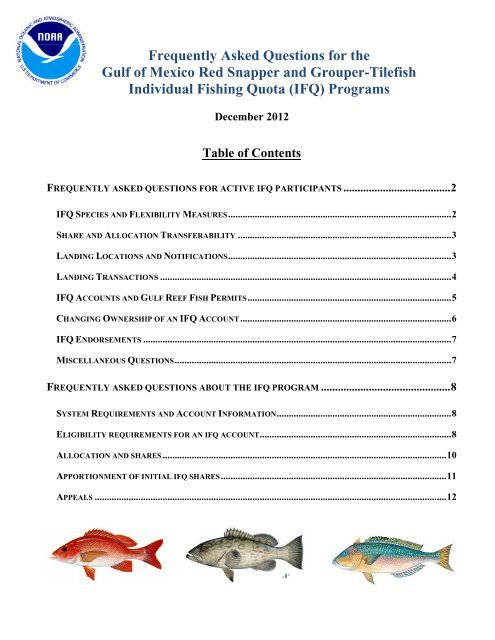
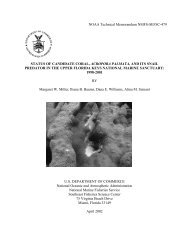
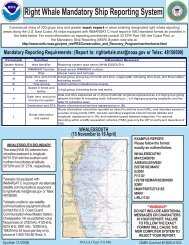
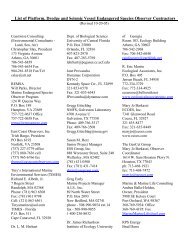
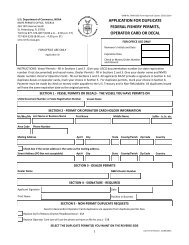
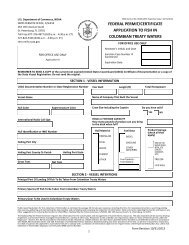
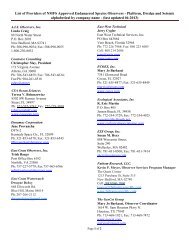
![Right Whale Fact Sheet [PDF] - Southeast Regional Office - NOAA](https://img.yumpu.com/28432664/1/190x245/right-whale-fact-sheet-pdf-southeast-regional-office-noaa.jpg?quality=85)
